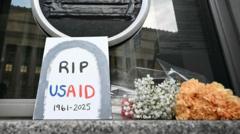The decision to suspend billions in overseas aid sparks fears of a resurgence of preventable diseases and undermined health services worldwide.
**Global Health Experts Sound the Alarm Over US Aid Cutbacks**

**Global Health Experts Sound the Alarm Over US Aid Cutbacks**
As USAID undergoes major funding freezes, health professionals warn of global disease outbreaks.
Experts in public health are expressing serious concerns regarding the recent decision by the United States government to freeze funding for international aid through the United States Agency for International Development (USAID). This significant move has led to immediate cuts in personnel and the suspension of numerous aid initiatives vital to global health. The current administration, under President Donald Trump, has instituted a 90-day freeze to review funding allocations, in line with their "America First" doctrine which has historically criticized foreign expenditures.
Health authorities have condemned this drastic measure, highlighting its potential to exacerbate the spread of infectious diseases and undermine critical progress in vaccine development and health care services. USAID does not just operate its own initiatives but also financially supports numerous non-governmental organizations (NGOs) that play crucial roles in health campaigns worldwide. The sudden funding suspension has led to chaos among these organizations, which depend heavily on timely resources for health provision.
Dr. Tom Wingfield, a tuberculosis (TB) expert from the UK's Liverpool School of Tropical Medicine, has expressed alarm about the potential consequences. He emphasized that diseases do not recognize borders, especially in the current climate of mass migration and climate change. The negative ramifications could be dire, especially considering that TB alone claims approximately 1.3 million lives each year, often due to insufficient access to care.
Moreover, the freeze jeopardizes essential services for individuals living with HIV, with various organizations reporting that they may soon run out of critical medicines and equipment needed to support treatments. The disruption of care for these vulnerable populations could lead to a resurgence of transmission rates, undoing years of progress made in managing the virus.
Frontline AIDS, a significant organization working in over 100 countries, has reported that more than 20 of its partners are already feeling the direct impact of the funding cuts, with many having to halt vital HIV services and lay off staff. Communication about the freeze has been inadequate, leaving many partners in a state of uncertainty and fear regarding their future operations.
Prof. Peter Taylor, an expert in international development studies, underscored the erosion of trust these financial decisions create in local communities, distancing them from support services they rely on. The potential long-term damage to the United States' reputation in global health is significant, with critical clinical trials also at risk due to the funding cessation.
Prof. Thomas Jaki of the University of Cambridge warned that the suspension of funding could drastically delay essential drug trials and even abandon promising new treatments. He highlighted that many advancements in combating diseases like malaria and HIV heavily rely on USAID funding.
Prof. Rosa Freedman from the University of Reading noted that USAID is responsible for about 40% of global development aid, with health services expected to bear the brunt of these cuts. She cautioned that if the funding freeze persists, diseases once thought to be under control could re-emerge, posing severe risks to global health stability.
As the 90-day review unfolds, the implications of these decisions will be closely monitored, with global health experts urging a reevaluation of the priorities that have led to this widespread fear of health crises on a global scale.
Health authorities have condemned this drastic measure, highlighting its potential to exacerbate the spread of infectious diseases and undermine critical progress in vaccine development and health care services. USAID does not just operate its own initiatives but also financially supports numerous non-governmental organizations (NGOs) that play crucial roles in health campaigns worldwide. The sudden funding suspension has led to chaos among these organizations, which depend heavily on timely resources for health provision.
Dr. Tom Wingfield, a tuberculosis (TB) expert from the UK's Liverpool School of Tropical Medicine, has expressed alarm about the potential consequences. He emphasized that diseases do not recognize borders, especially in the current climate of mass migration and climate change. The negative ramifications could be dire, especially considering that TB alone claims approximately 1.3 million lives each year, often due to insufficient access to care.
Moreover, the freeze jeopardizes essential services for individuals living with HIV, with various organizations reporting that they may soon run out of critical medicines and equipment needed to support treatments. The disruption of care for these vulnerable populations could lead to a resurgence of transmission rates, undoing years of progress made in managing the virus.
Frontline AIDS, a significant organization working in over 100 countries, has reported that more than 20 of its partners are already feeling the direct impact of the funding cuts, with many having to halt vital HIV services and lay off staff. Communication about the freeze has been inadequate, leaving many partners in a state of uncertainty and fear regarding their future operations.
Prof. Peter Taylor, an expert in international development studies, underscored the erosion of trust these financial decisions create in local communities, distancing them from support services they rely on. The potential long-term damage to the United States' reputation in global health is significant, with critical clinical trials also at risk due to the funding cessation.
Prof. Thomas Jaki of the University of Cambridge warned that the suspension of funding could drastically delay essential drug trials and even abandon promising new treatments. He highlighted that many advancements in combating diseases like malaria and HIV heavily rely on USAID funding.
Prof. Rosa Freedman from the University of Reading noted that USAID is responsible for about 40% of global development aid, with health services expected to bear the brunt of these cuts. She cautioned that if the funding freeze persists, diseases once thought to be under control could re-emerge, posing severe risks to global health stability.
As the 90-day review unfolds, the implications of these decisions will be closely monitored, with global health experts urging a reevaluation of the priorities that have led to this widespread fear of health crises on a global scale.























